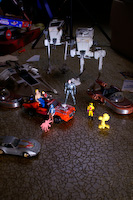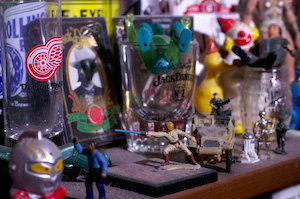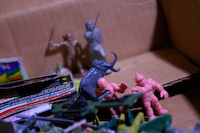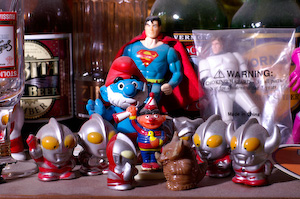I occasionally checkout the online paper of Michigan State University when I need to send some white noise through my brain and recover from the last dissertation writing session. The Editorial on April 13th by Jacob Carpenter got me thinking, and over a cappuccino those thoughts turned into some ideas that’d like communicate concerning the current situation in Iraq – specifically the interconnection between the US and USSR, how lessons from the Afghanistan War can be explored to explain the foolishness of the US government heading into Iraq, and why Iraq 2007 is not Germany – post World War Two (WWII).
Jacob wrote that Iraq can not be abandoned via a US troop withdrawl.
“To better understand the democratization of a country, which is the current mission in Iraq, it helps to reach back into the history books and revisit an example of a similar case.”
His reasoning sounds nice and has been echoed before, essentially that the US must stay in Iraq because after WWII the US pumped billions into then-devastated Germany and Japan, which eventually lead to their stabilization and democracies.
This Blog Post shouldn’t really be taken as a response to the State News Editorial, these are just some things to consider on the current state of geo-political affairs.? His editorial just gave me some motivation to write them down.
“Following the end of World War II, the United States didn’t abandon enemy Germany in its vulnerable state of disarray ? relatively equivalent to that of modern day Iraq.” – Jacob Carpenter
First, and this should be crystal clear to any half-interested Generation XY wannabe historian, Iraq is not Germany.? The circumstances surrounding the current Iraq War shares little with World War II, and the problem in Iraq is not so simple as staying the course or pumping money into the country or simply pulling out.? Using the post-WWII Germany/Japan analogy to rationalize the current US strategy in Iraq is dangerous and shot-sighted because it does not shed light on the current problem, which is:
How can Iraq move foreword in the current political situation?
Now some background on where these thoughts are coming from. I like to read, and if history is to be learned from, you have to move beyond the classroom and seek out your own facts. For an understanding on why post-WWII Germany is not Iraq and why it shouldn’t be treated as so, I recommend reading the following books:
Rise And Fall Of The Third Reich
See No Evil: The True Story of a Ground Soldier in the CIA’s War on Terrorism
Charlie Wilson’s War: The Extraordinary Story of How the Wildest Man in Congress and a Rogue CIA Agent Changed the History of Our Times
America’s Secret War: Inside the Hidden Worldwide Struggle Between the United States and Its Enemies
The Kite Runner
Some history notes (as I know them), prior to the establishment of the German state and national borders, Germany was a collection of different kingdoms and princes and landowners, which eventually formed into a set of German States. Then, with Bismarck in 1871 the various states were united into what is now (minus a few border changes) Germany.? Prior to WWII Germany had a functioning democracy with elections and checks and balances (which were to fail and allow Hitler to take absolute political control of the country).
The pre-WWII German scientific-industrial contribution to the world was massive. Most of the Nobel Prize winners prior to 1940 came from Germany, in addition, companies such as Mercedes-Benz, BMW, Zeiss and others started and still thrive globally. I think it’s often ignored or understated just how powerful German was, but the concept is easily illustrated by remembering that the division of German scientists after the war essentially defined a number of current global political situations.
Prior to WWII Europe was the Well from which scientific discoveries flowed. After its destruction the US realized it would need to establish its own Well and the federal funding of research in the US with public funds began in the 1950’s.
How did the US and USSR develop the ability to shoot long range missiles at one another and at any other country? What was the enabling movement which allowed the USSR to send cosmonauts into space and the US to land men on the Moon? Simple, after the defeat of Nazi-Germany the US picked up Wernher von Braun (the head of the Nazi V-2 Missile program) with a truck full of rocket research documents. Around the same time period, the Soviets forcibly transplanted every German rocket scientist they could find in occupied Germany to Siberia, where they reenacted the work they had done on the Nazi missile program. Dr. von Braun eventually became the head of NASA while the US and USSR began the Nuclear Arms Race and the Space Race.
The point here is that Germany had the knowledge base, collective will, and stability to rebuild after its destruction – because many of those elements were in-place prior to the devastation.? Hitler was really only in total control for a short while (compared with Iraq).? He took over more or less around 1933, and Nazi-Germany was defeated in 1945. Saddam Hussein was in total power from about 1980 until 2003. During this time he was able to build a lasting framework for keeping the people down and eradicating the notion of a real democracy.
The most important difference from my view is that Germany was united by language and religion. Iraq is mostly united in language, but for sure very divided by religious and ethnic traditions. Also, I think that in general, Germany has maintained a social tradition of working for the common good of the country, because the internal conflicts between different ethic groups and religious desires were more or less worked out in the centuries preceding the First World War.
Currently the fragmented factions and ethnic groups in Iraq have had to fight for the survival of their own entities, therefore a unification of the country is a monumental task even without the instability of the war to prevent rebuilding.
Ok you say, but still it was all the US military personnel in Germany that made the difference between chaos and rebuilding. Let’s just keep the troops in Iraq, and do the same as with Germany post-WWII and Iraq will be ok in 20 years.
Coming up next: Why imitating the US military strategy of post-WWII Germany doesn’t easily translate to stability for 2007 Iraq.














